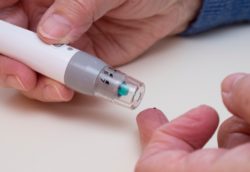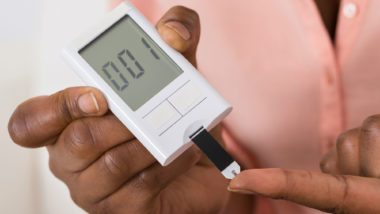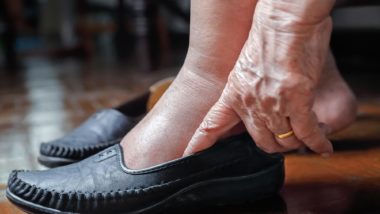Top Class Actions’s website and social media posts use affiliate links. If you make a purchase using such links, we may receive a commission, but it will not result in any additional charges to you. Please review our Affiliate Link Disclosure for more information.
Two related diabetic drugs, Invokana and Invokamet, have been linked to an elevated risk of diabetic amputation according to the U.S. Food and Drug Administration (FDA). This information comes from the manufacturer’s own clinical studies, which showed that diabetic patients who took these drugs were more than twice as likely to suffer complications leading to lower limb amputations compared with those in the control group.
Ironically, lower limb amputations were one of the dangers that Invokana was intended to prevent – and there are other serious side effects as well that include heart disease, kidney failure, and eye damage – again, all conditions that the medication was supposed to guard against.
What is Invokana?
Invokana is a member of a class of medications known as “gliflozins” (hence its generic name, canagliflozin). Also known as “sodium glucose co-transporter 2 (SGLT2) inhibitors,” these medications essentially prevent the kidneys from reabsorbing excess blood sugar and re-releasing it into the bloodstream – allowing it to be passed in the urine.
Invokana was considered a “miracle drug” when it was first introduced in 2013, despite concern expressed by prominent physicians. During a meeting of the FDA’s Endocrinologic and Metabolic Drugs Advisory Committee (EMDA), Dr. Sidney Wolfe of the consumer watchdog organization Public Citizen pointed out that there was “…no evidence of any improved clinical outcomes, contrary to an older diabetes drug such as metformin.”
Noting that the FDA was basing its approval “solely on surrogate efficacy of HbA1c lowering,” Dr. Wolfe warned that this particular factor needed to be “balanced against a number of serious safety signals identified in the clinical trials.”
Diabetic Amputation and More
Despite warnings by Dr. Wolfe and his colleagues, the FDA proceeded to grant drug manufacturer Janssen Pharmaceuticals approval on the condition that the company would monitor Invokana for adverse event reports and carry out post-market studies over the next four years. Problems soon became apparent; reports of cardiovascular disease started coming in, confirming one of Dr. Wolfe’s initial fears.
Since then, Invokana and Invokamet (canagliflozin and metformin) have been associated with diabetic ketoacidosis, kidney failure, osteoporosis, and inflammation of the pancreas.
In 2017, MedPage Today reported that a number of healthcare providers, including the Veterans Health Administration, had stopped prescribing the drug over concerns about diabetic amputation and other complications. Despite this, Janssen has continued to seek new FDA approvals for additional indications, including weight loss and oddly (in light of adverse event reports), the prevention of cardiovascular events.
Keeping Certain Risks in Perspective
According to an article posted on endocrineweb.com, the risks that have been identified with regard to Invokana and Invokamet and heart and circulatory issues resulting in amputation need to be viewed through a balanced lens. As indicated by Dr. Gonzalez-Campoy–medical director and CEO of the Minnesota Center for Obesity, Metabolism and Endocrinology and a member of the editorial board for EndocrineWeb—association doesn’t prove causation.
The doctor claims that those enrolled in the CANVAS and CANVAS-R studies had had type-2 diabetes for a long period of time and had significant risk factors prior to even starting a drug regiment with Invokamet. In many cases, heart problems—a known side effect of diabetes–may have already been present.
CANVAS or the CANagliflozin cardioVascular Assessment Study was the pre-approval clinical trial which initially revealed an increased risk of cardiovascular issues. After the FDA granted conditional approval of the drug, the agency required a four-year follow-up study known as CANVAS-R or the Study of the Effects of Canagliflozin on Renal Endpoints in Adult Participants with type-2 Diabetes Mellitus.
Speculation as to Reason for Connection
Gonzalez-Campoy hypothesizes that because the SGLT2 inhibitor drug class works on the kidneys, patients can quickly enter a state of dehydration without constant and vigilant care on their part to offset this effect. Dehydration can lead to the overall restriction of blood vessels—particularly to the lower extremities.
As indicated by the endrocrineweb.com article, he believes this state can reduce blood flow and bring on ulceration of the feet, allowing for bacterial infections to gain hold. This process ultimately leads to amputation when it gets out of control. Nevertheless, he believes balance is the key. Physicians need to consider the health condition of all people they consider prescribing these drugs to and patients need to be hypervigilant to care for their feet and report tender or red spots to their medical team.
Invokana Litigation
In October 2018, Janssen Pharmaceuticals and its parent company, Johnson & Johnson, reportedly entered into a settlement with hundreds of plaintiffs in multi-district litigation before a U.S. District Court in New Jersey. However, according to the New Jersey Law Journal the drug makers have not admitted to any liability.
Additional Invokana lawsuits are pending in California and Pennsylvania; a class action lawsuit has also been filed in Canada. Legal experts anticipate that the defendants will enter into additional settlements in the coming months.
Contact an experienced Invokana attorney today to discuss your legal options if you or a loved one had to undergo a lower limb amputation after taking Invokana, Invokamet or Invokamet XR, including a toe amputation, foot amputation, knee amputation or leg amputation. Fill out the form on this page to obtain a FREE case evaluation with an Invokana amputation attorney.
ATTORNEY ADVERTISING
Top Class Actions is a Proud Member of the American Bar Association
LEGAL INFORMATION IS NOT LEGAL ADVICE
Top Class Actions Legal Statement
©2008 – 2024 Top Class Actions® LLC
Various Trademarks held by their respective owners
This website is not intended for viewing or usage by European Union citizens.
Get Help – It’s Free
Join a Free Invokana Class Action Lawsuit Investigation
If you qualify, an attorney will contact you to discuss the details of your potential case at no charge to you.
Please Note: If you want to participate in this investigation, it is imperative that you reply to the law firm if they call or email you. Failing to do so may result in you not getting signed up as a client or getting you dropped as a client.
E-mail any problems with this form to:
Questions@TopClassActions.com.
Oops! We could not locate your form.













